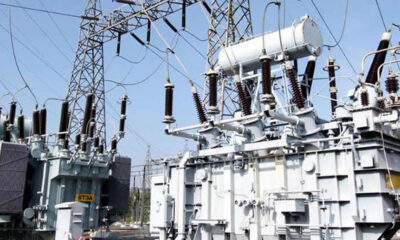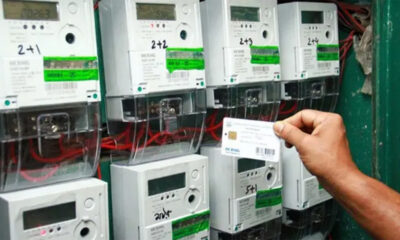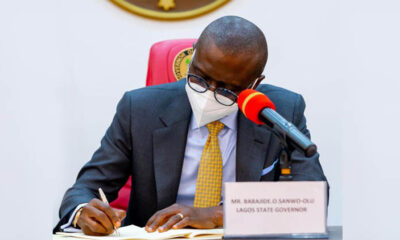News
DisCos apologise as power supply worsens, generation drops to 3,134MW

DisCos apologise as power supply worsens, generation drops to 3,134MW
The poor electricity situation nationwide has worsened with the decline of power supply to the national grid.
Many communities across the length and breadth of the country have since last month been experiencing low energy supply and in some instances, outright blackouts.
Yesterday, the Transmission Company of Nigeria (TCN) confirmed the low power supply to the national grid.
It announced the cut in load allocation to the 11 electricity distribution companies (DisCos).
It has been reduced to 3,134 megawatts (MW) from the meagre 3,814.68mw generated.
According to the Independent System Operator (ISO) of the TCN, the decline was due to gas constraints.
The transmission company noted that allocation to the DisCos, which stood at 3,944mw on Tuesday, rose marginally on Wednesday to 4,004mw before it dropped to 3,134mw yesterday.
TCN General Manager (Public Affairs), Ndidi Mbah, said in a statement that the company was working in partnership with stakeholders to keep the grid intact despite the current low power generated into the system.
According to him, the TCN was limited to what is generated at any moment.
The statement reads: “The TCN hereby announces that there has been a gradual decrease in available generation into the grid due to gas constraints to the thermal generating companies.
“This has impacted the quantum of bulk power available on the transmission grid for onward transmission to the distribution load centres nationwide.
“TCN is doing everything possible in collaboration with stakeholders in the power sector to ensure that it continues to keep the grid intact in spite of the current low power generated into the system.
“Consequent upon the current load on the grid, load distributed to the distribution load centres have also reduced, as TCN can only transmit what is generated.
READ ALSO:
- Terrorists kill Imam, 2 others in Katsina
- Police arrest Mr. Ibu’s son, adopted daughter over alleged fraud
- Troops overrun ESN camps at Okigwe, uncover burnt policemen corpses
“TCN is committed to ensuring a gradual increase in electricity supply to load centres as gas improves to power available thermal plants.
“Please bear with us as we continue to work with the stakeholders in the value chain to ensure that supply through distribution companies to electricity consumers nationwide improves.”
DisCos apologise
The Benin Electricity Distribution Company (BEDC) lamented the low load allocation.
According to the energy distributor which services Delta, Edo, Ekiti and Ondo, the constraint was beyond the DisCos, blaming it limited allocation supply from the national grid.
The BEDC management, in its apology to its customers on its X (formerly Twitter) handle, said: “We wish to inform you that the reduction in supply hours currently being experienced in our franchise states (Delta, Edo, Ekiti and Ondo States) is due to constraint beyond our control, specifically limitations in allocation from the national grid.
“The inconvenience is regret and we sincerely apologise for any disruption to your daily routines.
“Please be assured that we are working diligently with all stakeholders to improve the situation and resume regular supply as soon as possible.
“We also wish to apologise for the delay in meeting the earlier publicised timeline for maintenance of the Sapele Transmission Substation and Ihovbor Transmission Substation. This delay is due to prevailing technical factors.
“However, we want to assure you that the work on both substations is progressing well. We anticipate completing the maintenance process and restoring full capacity soon.”
Eko Electricity Distribution Company (EKEDC) on its official X handle apologised to its customers.
“Kindly be informed that the present reduction in power supply across our network is due to gas shortages and other related issues arising from the generating companies.
“We sincerely apologise for the inconvenience this has caused even as we
work with our partners for speedy resolution. Kindly bear with us,” the EKEDC wrote.
Head of Media Relations, Ibadan Electricity Distribution Company (IBDEC), said the situation has hampered supply to its esteemed customers across its network.
IBDEC said in a statement: “ Dear Esteemed Customer, kindly be informed that the drop in electricity supply currently being experienced is a result of the load allocation constraints across our franchise from the national grid.
“We are working with stakeholders in the electricity value chain on a sustainable resolution. We sincerely apologise for the inconvenience and appeal for your understanding.”
Minister: boost for national grid coming
Meanwhile, while Nigeria struggles with generation capacity, South Africa and Egypt lead on the continent as the countries with the highest electricity generation capacity. In South Africa, domestic power generation currently stands at 58,095 megawatts (MW) from all sources, according to figures from the country’s Ministry of Mineral Resources and Energy.
READ ALSO:
- Noise pollution: Lagos seals RCCG, Dominion City, five other churches
- NAFDAC dispels allegations of under-dosed paracetamol tablets in Nigeria
- AFCON: Don’t watch us on TV anymore – Super Eagles captain, Musa sends message to Tinubu
Of this figure, coal-fired electricity remains by far the major energy source for the country, accounting for about 80 per cent of the country’s energy mix.
Others like Hydro contribute 3,485 MW; thermal, 48,380 MW; wind, 2,323 MW; solar, 2,323 MW, and other sources contribute 580 MW.
In Egypt, the total amount of installed electricity generation capacity as of September 2023, stood at 58,818 megawatts.
But Nigeria’s national grid may soon get a boost with the addition of 30 megawatts from the Kashimbilla hydropower plant.
The addition is expected to facilitate the development of small and medium enterprises (SMEs) in Taraba and Benue states.
Surrounding communities in Taraba, especially those displaced by the Dam construction, are already benefitting from the 10 megawatts currently being distributed directly from the 40 megawatts capacity plant.
Speaking during the inspection of the plant and the 56 km, 132KV transmission line from Yandev to Makurdi in Benue, the Minister of Power, Adebayo Adelabu, said the Kashimbilla plant with its state-of-the-art technology was working effectively.
Adelabu, who also visited the 132/33KV substation in Amua, Gboko Local government area of Benue, said the four turbines installed in the Kashimbilla power plant were working well and generating 100 per cent of the installed capacity.
The power plant has an installed capacity of 40 megawatts but only 10 megawatts are currently being evacuated.
Enugu community grounds power project
A multi-billion naira 260/133KV completed power sub-station located at the 9th Mile Corner, Udi Local Council, Enugu State, has been grounded.
This follows a lawsuit against the contractor by some members of the community.
The sub-station contract, which was awarded by the Federal Government through the Niger Delta Power Holding Company (NDPHC) to boost supplies around the 9th Mile industrial area and Nsukka, had since been completed and nearing 80 per cent energisation.
But, a suit brought against one of the contractors, Pivot Engineering Company, kept the project out of use and under the threat of vandals.
READ ALSO:
- Japa: Kano man stopped from killing self over visa ordeal
- Presidency tackles Atiku over claim on NNPC’s $3.3b loan
- ‘I cannot be intimidated out of Edo governorship race,’ Boastful Shaibu dares Obaseki
According to the TCN General Manager, Enugu Region, Emma Akpa, who took reporters around the facility, the aggrieved community members claim that they were short-changed during settlement for passage rites and, therefore, went to court to stop the work.
Akpa said when the contract was awarded two years ago, the Federal Government engaged two contractors, Pivot contractors, to handle the energisation line, while the NBH contractors were required to build the sub-station.
He, however, lamented that since the project stalled in early 2023, no fewer than 12 towers had been vandalised at the sub-station, as the suit subsists.
Delta women protest blackout, high bills
Also yesterday, hundreds of women in Effurun metropolis of Delta State protested against BEDC over high electricity bills despite almost a year blackout.
The protest which began late morning, left motorists and commuters plying the East/West Road and NPA Highway stranded at the Effurun Roundabout until evening.
Women with their babies strapped behind them were part of the protest.
Bearing placards, leaves and stainless pans with sticks, the women from Alegbo, Masoje and Uti areas marched through PTI Road to Jakpa Junction and on to Effurun Roundabout, through the Effurun/Sapele Road.
Chanting “no light, no bill”, they vowed not to end the protest until the relevant authorities addressed the situation.
DisCos apologise as power supply worsens, generation drops to 3,134MW
The nation
News
Why governors’ forum is silent on Rivers emergency, by DG
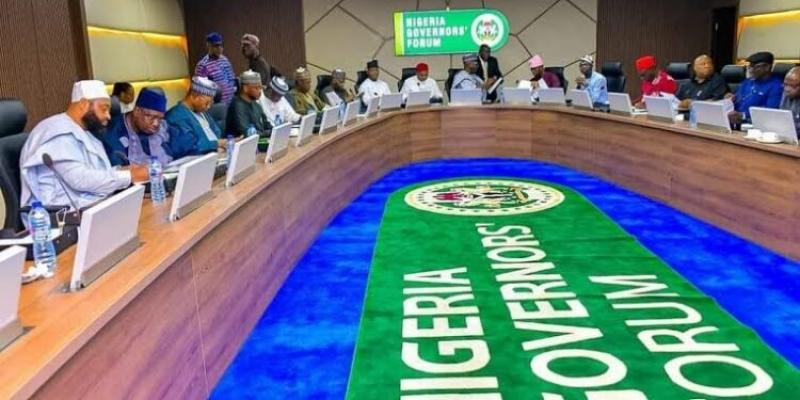
Why governors’ forum is silent on Rivers emergency, by DG
The Nigeria Governors’ Forum (NGF) yesterday attributed its neutral position on the recent declaration of a state of emergency in Rivers State to the need to steer clear of taking positions that may alienate members with varying political interests.
Taking positions on contentious partisan issues, the NGF said, would not augur well for it, especially in view of its past experience in fundamental division.
Notwithstanding, the declaration of the state of emergency by President Bola Tinubu yesterday generated more kudos and knocks from across the country.
Special Adviser to the President on Senate Matters, Senator Basheer Lado, said the action of the president was meant to ensure protection of lives and restoration of law and order in the state, while the President’s Special Adviser on Media and Public Communications, Sunday Dare, said his principal was required to “avert needless harm and destruction .”
National Publicity Secretary of the ruling All Progressives Congress (APC), Felix Morka, said Tinubu, by his action, cleared what had manifested as a constitutional crisis in Rivers state.
But former President Goodluck Jonathan saw it from a different perspective.
READ ALSO:
- Senate didn’t get 2\3 majority for Tinubu emergency rule in Rivers –Tambuwal
- FG destroys another 200 containers of expired drugs
- Rivers court bars woman from answering ex-husband’s name
He described “abuse of office and power by the three arms of government in the country“ as a dent on Nigeria’s image.
The NGF, in a statement by its Director General Abdulateef Shittu, said it is essentially “an umbrella body for sub-national governments to promote unified policy positions and collaborate with relevant stakeholders in pursuit of sustainable socio-economic growth and the well-being of the people.”
It added: “As a technical and policy hub comprising governors elected on different platforms, the body elects to steer clear of taking positions that may alienate members with varying political interests.
“In whatever language it is written, taking positions on contentious partisan issues would mean a poor sense of history — just a few years after the forum survived a fundamental division following political differences among its members.
“Regardless, the Forum is reputed for its bold positions on governance and general policy matters of profound consequences, such as wages, taxes, education and universal healthcare, among others.”
It asked for “the understanding of the public and the media, confident that appropriate platforms and crisis management mechanisms would take care of any such issues.”
Why governors’ forum is silent on Rivers emergency, by DG
News
Rivers: Tinubu acted to save state, economy, says Karimi
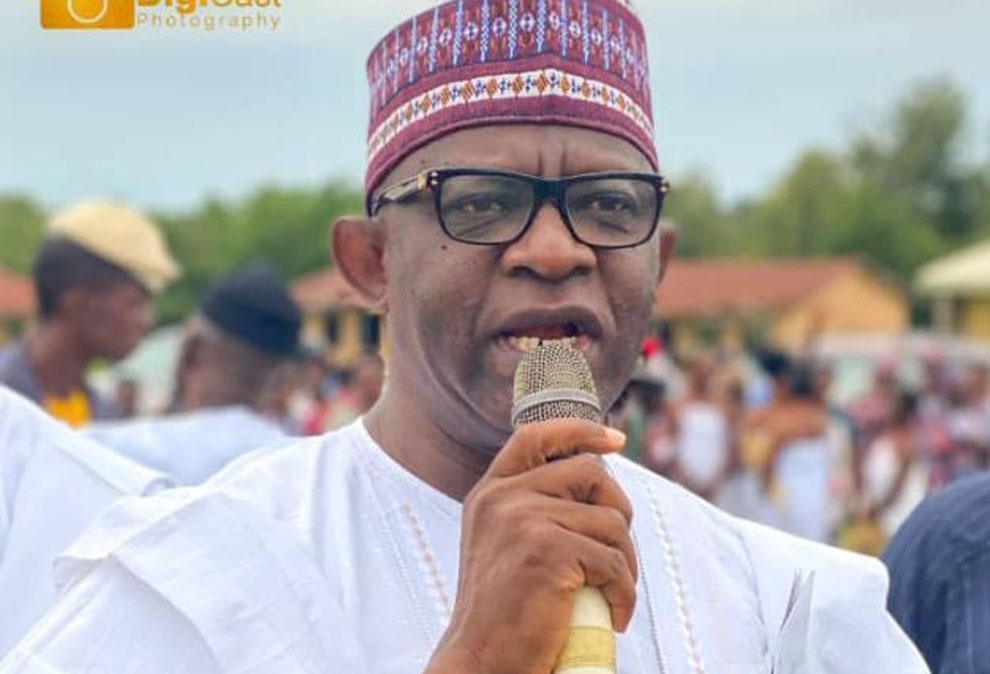
Rivers: Tinubu acted to save state, economy, says Karimi
Chairman of the Senate Services Sunday Karimi has hailed President Bola Tinubu for the decision to declare a state of emergency in Rivers State.
He told reporters on Friday in Abuja that the President acted in the best interest of the State and Nigeria, having taken his decision in compliance with the Constitution.
“No President or government worth a name, will fold its arms and watch a political situation deteriorate to what we saw unfolding in Rivers State.
“We saw that bombing of pipelines had begun, and the security situation was getting worse with the tension everywhere”, Karimi stated.
Karimi, who represents Kogi-West on the ticket of the All Progressives Congress (APC), recalled the “fatherly role” Tinubu had played in the crisis since 2023 in a bid to get the Minister of the Federal Capital Territory (FCT), Nyesom Wike, and suspended Governor Siminalayi Fubara to reach an understanding, to no avail.
He explained: “We were all here in 2023 when Mr President called that truce meeting at the Aso Rock Villa. There was the eight-point agenda for settlement reached between the factions.
“When Nigerians expected that progress should be made to achieve peace, things started deteriorating considerably to a point where the governor demolished the House of Assembly building and administered the state with only three legislators.”
READ ALSO:
- Oluwo accuses Ooni of plotting to dethrone him
- Natasha: Court blocks recall attempt, stops INEC
- US ends legal status for 500,000 immigrants
Karimi observed that with the recent judgment of the Supreme Court, which gave the upper hand to the 27 lawmakers loyal to the camp of the FCT Minister, matters merely got worse in the State as the lawmakers were set to impeach the Governor.
“What did you expect would be the implications? There would have been more destruction, killings and economic losses for the country.
“With the bombings that had already started, it was a matter of time before the whole state would be engulfed in flames. No responsible President would sit, arms folded, and allow that to happen “ he added.
The senator further argued that it took “painstaking efforts” by the administration to raise daily crude oil production to around 1,800 barrels, noting that Nigeria’s economy was already “witnessing a rebound under the renewed hope projects of the government.”
“Allowing the situation in Rivers to get worse before he would act, wouldn’t have helped the state or Nigeria as a country in any way.
“Mr. President intervened at the right time, and his actions are covered by law,” he said.
Karimi also spoke on the emergency declaration in Borno, Yobe, Adamawa and a couple of other states by former President Goodluck Jonathan without removing the Governors from office or suspending the state assemblies.
According to him, the case with those States was not generated by political crises but rather security concerns.
“So, I will advise those comparing the two scenarios to remember that one was purely about security threats resulting from the insurgency caused by Boko Haram, while that of Rivers is clearly political.
“It was the proper thing to do to suspend the political actors in the two factions to allow for tensions to diffuse. Nigerians should appreciate the President for the action he has taken so far,” he stated.
Sen. Karimi also noted that there was no cause for alarm as the National Assembly had indicated that the emergency rule could be reviewed as soon as there were signs that things could quickly normalise in Rivers State.
Rivers: Tinubu acted to save state, economy, says Karimi
News
Just in: Tinubu swears in Rivers Sole Administrator Ibas
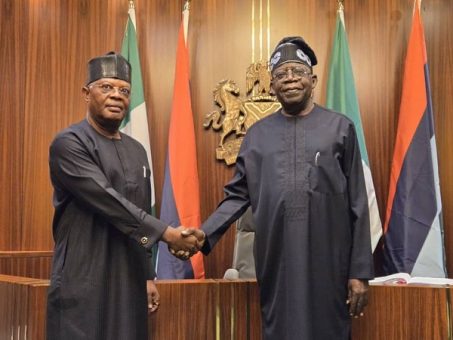
Just in: Tinubu swears in Rivers Sole Administrator Ibok-ete Ibas
President Bola Tinubu has sworn in Vice Vice Admiral Ibok-ete Ibas (Retd.) as the Sole Administrator of Rivers State.
The administrator was sworn in on Wednesday after a short meeting with the President.
Tinubu announced the appointment of the retired naval chief at a nationwide broadcast on Tuesday, when he declared a state of emergency in Rivers State and suspended Governor Siminalayi Fubara, Deputy Governor, Ngozi Odu, and the state House of Assembly members.
The President said his decision was based on Section 305 of the 1999 Constitution, saying he could not continue to watch the political situation in Rivers escalate without taking concrete action.
The suspension of Fubara and other elected representatives has been rejected and condemned by many eminent Nigerians, legal luminaries, groups such as Atiku Abubakar, Peter Obi, Femi Falana, the Labour Party (LP), the Peoples Democratic Party (PDP) and the Nigerian Bar Association.
However, the emergency rule has been praised by the pro-Nyesom Wike Assembly led by Martins Amaewhule, accusing Fubara of contravening the Supreme Court ruling on the political situation in the state.
Ibas was the Chief of Naval Staff from 2015 to 2021.
He is from Cross River State where he had his early education.
The new sole administrator went to the Nigerian Defence Academy in 1979 from where he proceeded to have a successful career in the Navy, rising through the ranks to the very top.
He is a member of the Nigerian Institute of International Affairs (NIIA) and the Nigerian Institute of Management.
President Muhammadu Buhari who appointed him as Chief of Naval Staff conferred him with the National Honour of Commander of the Federal Republic (CFR) in 2022.
-
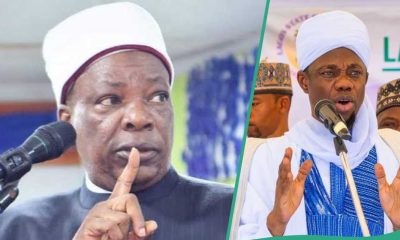
 metro2 days ago
metro2 days agoAttack on Mufty of Ilorin: Onikijipa Family Charges Stakeholders to Call Sheikh Habibullahi Al-Ilory to Order
-

 Health3 days ago
Health3 days agoNigerian doctor pioneers W’Africa first robotic prostate cancer surgery
-
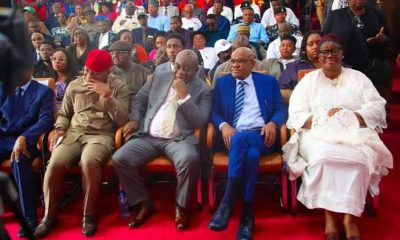
 metro3 days ago
metro3 days agoFubara: Supreme Court reacts to photo of Justice Agim with Wike
-

 metro13 hours ago
metro13 hours agoRivers administrator Ibas fires Fubara’s political appointees
-
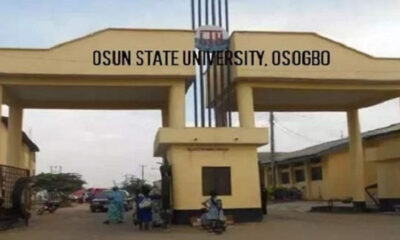
 metro3 days ago
metro3 days agoUNIOSUN mourns as 5 students die in auto crash
-

 metro12 hours ago
metro12 hours agoJUST-IN: Ex-Oyo gov Ajimobi’s first child Bisola dies At 42
-

 metro1 day ago
metro1 day agoHow ritualists, native doctor drugged, murdered underage sisters in PH – Police
-

 International2 days ago
International2 days agoCanada removes bonus ranking points for job offers in Express Entry system





